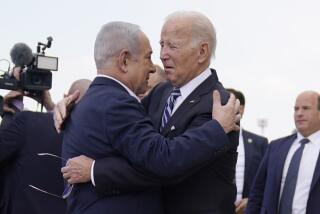Rabin-Peres Clash on Palestinians Casts Doubt on Talks : Israel: The premier resists his more dovish foreign minister’s push for immediate discussion of a final settlement for the occupied territories.
- Share via
JERUSALEM — Prime Minister Yitzhak Rabin clashed publicly Tuesday with Foreign Minister Shimon Peres over ways to resolve the Palestinian problem, casting new doubts over prospects for the Arab-Israeli peace negotiations.
Peres, the more dovish official, urged an acceleration of talks with greater Israeli flexibility, calling the next two weeks crucial on the core issue of Palestinian autonomy. Ultimately, the occupied West Bank and Gaza Strip would join Jordan in a Palestinian-Jordanian confederation, Peres said, suggesting Israeli acceptance of Palestinian statehood.
But Rabin, a former army chief of staff, replied that moving too quickly would require unwarranted concessions by Israel. He opposed any discussion now of a final settlement, fearing this would “blow up” the current talks.
Where Peres had said, “We are facing two decisive weeks in the negotiations and must accelerate them,” Rabin declared, “I am not concerned about the remarks of the foreign minister, but it is a mistake to think that the negotiations will be decided in two weeks.”
While neither leader’s position was new, their differences--stated in separate interviews with Israel’s top-selling newspaper, Yediot Aharonot--appeared to be growing and could complicate the Arab-Israeli talks in Washington just as they were starting to advance.
“If somebody wants to finish quickly, to give the other side everything, then it is possible to finish quickly,” Rabin said. “I don’t intend to do that.”
Old rivals, the two men have worked in tandem in the year since Rabin wrested leadership of the Labor Party back from Peres after 15 years and led the party to victory in last June’s parliamentary elections. While still suspicious of each other--Rabin once branded Peres an “indefatigable saboteur”--both had decided that, as a team, they could bring Israel peace.
That compact had already begun to fray, Israeli insiders said, when Peres set out his positions on key issues, distinguishing them from those of Rabin, during Cabinet discussion of the negotiations last Sunday.
Peres, voicing what the influential newspaper described as “words of heresy,” called upon Rabin to meet the Palestinians’ demand to discuss the final resolution of the Palestinian problem now, not after three years of self-government.
The foreign minister then proposed that Israel back a Palestinian-Jordanian political confederation and a Palestinian-Jordanian- Israeli common market as a basis for this final settlement and, in this way, accelerate negotiations on the interim stage of autonomy.
“A confederation is unacceptable to me,” Rabin told Yediot Aharonot, “and in general why relate to a subject that is not on the agenda and that is not the government position?”
Rabin’s difference with Peres is not over the need for an Israeli initiative at this juncture but over its scope.
“I am ready to give the Palestinians the administration of such areas as health and education and (control of) municipal matters while we retain control of security matters,” Rabin said. “But I don’t see the permanent solution in a confederation since a confederation is between two sovereign states. Whoever says a confederation between Jordan and the Palestinians says, first of all, a Palestinian state. And I oppose that.”
Another difference that resurfaced at Sunday’s Cabinet meeting, Israeli sources said, was Peres’ call for elections on the West Bank and Gaza Strip to choose a Palestinian leadership to complete the present negotiations with a popular mandate (which the present delegation lacks) and then form the first administration of the autonomous region.
But Peres reportedly won little support in the Cabinet as other ministers expressed fears that the elections would bring an upsurge in violence among Palestinians competing for power.
Meantime, in the Gaza Strip, Israeli troops shot three Palestinians to death Tuesday and wounded at least 44 others in a flare-up of violence in which seven Palestinians have been killed in two days. An eighth, a West Bank youth wounded by soldiers 10 days ago, also died Tuesday.
Clashes erupted throughout the Gaza Strip after protests over the fatal shooting of four Gazans the night before, according to resident journalists; 16 Palestinians have been killed in Gaza in the past two weeks.
In Washington, the State Department said Tuesday that the United States plans to fund a $14-million job-creation program in the West Bank and Gaza Strip.
More to Read
Sign up for Essential California
The most important California stories and recommendations in your inbox every morning.
You may occasionally receive promotional content from the Los Angeles Times.










